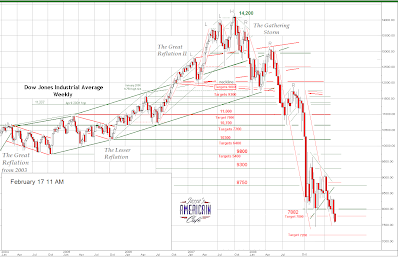China is proposing a new reserve currency regime less dependent on the dollar, along with other BRIC countries, and the US and its financial allies in the status quo will resist change because it is in their short term interest to do so.
China can take 'pre-emptive' action by diversifying its holdings ahead of any change, and there are some indications that it is doing so already. But while the dollar is the prime medium of international trade, China must buy dollars to support its mercantilist industrial policy. Its own alternative is to boost its domestic consumption and 'grow a middle class' which in some minds erodes the power of the narrow political elite which rules the country.
The US needs to stand firm in some areas, and acquiesce in others. Standing firm with regard to the yuan being free of a peg and currency controls is one area that ought to have been sine qua non when first Clinton and then Bush gave China its openings as a preferred trading partner even while maintaining de facto industrial subsidies through its currency and markets.
The first line of negotiation will be to agree on a dollar substitute, which will probably be the SDR. The US will resist and delay this as long as is possible.
The fallback position then will be the composition of the SDR, and a long phasing of the change in the primacy of the dollar and a few G7 currencies. China will seek more diversity and the inclusion of gold and silver, which is anathema to the Wall Street banking cartel.
The US must change or face more seismic, involuntary dislocations. As Britain surrendered its far flung colonial Empire, so the US must downsize its financial sector, restore balance to its own economy and its place in the world economy, and relinquish the primary reserve currency status which has become a powerful instrument of manipulation by the Wall Street banking cartel.
The dollar is the last, the mother of bubbles. Few understand this even now.
The epic US credit expansion was enabled by the preferred position of US debt instruments as the reserve currency of the world. The bond and the dollar are the absolute foundation of that debt pyramid.
Those days are undeniably over. What comes next and in what order and timing remains open to question for sure, but that substantial change is occurring is not.
The difficulty is that the financial institutions are a powerful influence over many key politicians in Washington and London and thought leaders and media outlets around the country, and in some parts of the world.
The military-industrial complex of which Eisenhower warned has become a real impediment to freedom in the US, but ironically it is not the manufacturing sector but the service, or FIRE sector, which has its grip on US political decision-making.
Obama could have changed this and there was hope that he would, but all that he has does so far appears to demonstrate that he and his advisors are fully compromised by the potent financial interests controlling their country.
What comes next, no one can say. But change is in the wind, and with that change comes the rise and fall of powerful but all too human institutions which many still believe can last for a thousand years, even as they are on the brink of der untergang, their downfall.
Reuters
China requests reserve currency debate at G8
Wed Jul 1, 2009 11:58am EDT
July 1 (Reuters) - China has asked to debate proposals for a new global reserve currency at next week's Group of Eight summit in Italy and the issue could be referred to briefly in the summit statement, G8 sources said on Wednesday.
One G8 source who was involved in the negotiations said China made the request during preparatory talks about a joint statement to be issued on the second day of the summit in L'Aquila by the G8 plus the G5 (Brazil, India, China, Mexico and South Africa) and also Egypt.
This forum, the so-called "G14", meets on July 9 to discuss the financial crisis, trade and climate change and for the first time a G8 summit will also produce a joint G14 statement.
A European source with knowledge of preparations for the summit also said China had raised the subject of a reserve currency debate and that it might be mentioned during the meeting, though the source added: "Any country at the meeting can raise issues they see fit." (China is not just 'any country' these days - Jesse)
"But whether there is a specific mention in the communique remains open," said the European source, adding that sherpas would discuss this further in preparatory talks on Friday.
The debate centres on proposals by some emerging powers that an alternative should be found to the U.S. dollar as the global reserve currency, to reflect the shifting balance of power in the globalised economy.
China's central bank governor said in March the world should consider using the International Monetary Fund's Special Drawing Rights (SDRs) as a super-sovereign currency. The SDR is an international reserve asset allocated to IMF members and its exchange rate is determined by a basket of dollars, euros, sterling and yen. (China also wishes to modify its composition - Jesse)
But the Chinese proposal failed to gain ground after several world leaders, and officials from the IMF, backed the dollar as the global reserve currency. (Reporting by Reuters bureaux)





































